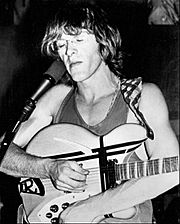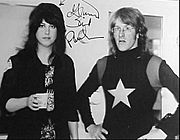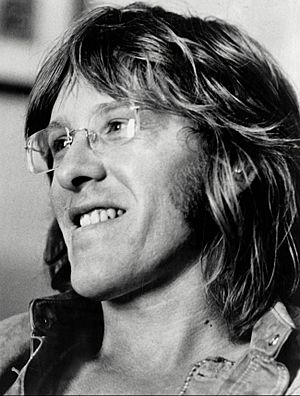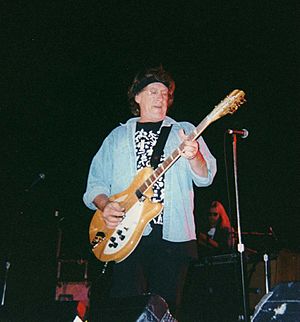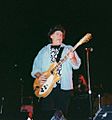Paul Kantner facts for kids
Quick facts for kids
Paul Kantner
|
|
|---|---|
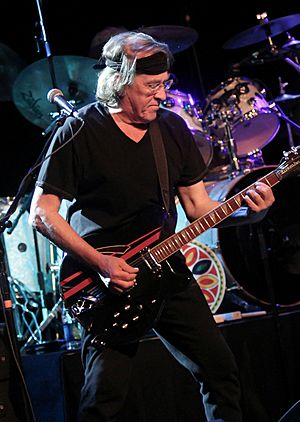
Paul Kantner, 2011
|
|
| Background information | |
| Birth name | Paul Lorin Kantner |
| Born | March 17, 1941 San Francisco, California, U.S. |
| Died | January 28, 2016 (aged 74) San Francisco, California, U.S. |
| Genres | folk rock, acid rock |
| Occupation(s) | Musician |
| Instruments | Vocals, guitar |
| Years active | 1964–2016 |
| Labels | RCA, Grunt, Arista |
| Associated acts | Jefferson Airplane, Jefferson Starship, KBC Band |
Paul Lorin Kantner (March 17, 1941 – January 28, 2016) was an American rock musician. He was a co-founder, rhythm guitarist, and singer for the famous band Jefferson Airplane. This band was very important during the 1960s, a time of big changes in music and society.
Paul Kantner also played a key role in Jefferson Starship, which was a band that came after Jefferson Airplane. He was a member of these bands for many years, longer than almost anyone else. In 1996, he was honored by being inducted into the Rock and Roll Hall of Fame as a member of Jefferson Airplane.
Contents
Paul Kantner's Early Life
Paul Kantner was born in San Francisco, California, on March 17, 1941. When he was eight years old, his mother passed away. His father, who was a traveling salesman, sent Paul to a Catholic military boarding school.
It was in the school library that Paul discovered science fiction books. He loved reading them and found them a great escape. From then on, science fiction and music became very important to him. As a teenager, he became a protest folk singer, inspired by his hero, Pete Seeger.
After high school, he went to college for three years. But he decided to leave to focus on music. He wanted to be part of the growing music scene in San Francisco.
Paul Kantner's Music Career
Forming Jefferson Airplane (1965–1974)
In the summer of 1965, Paul Kantner met singer Marty Balin. Together, they decided to start a new band called Jefferson Airplane. Paul suggested his friend Jorma Kaukonen as the lead guitarist.
Paul Kantner played rhythm guitar and sang for the band. He was the only musician who appeared on every album by Jefferson Airplane and later Jefferson Starship. His songs often had fun or political lyrics. They sometimes included themes from science fiction or fantasy.
Paul became a main creative force for Jefferson Airplane. He wrote or co-wrote many popular songs. These included "The Ballad of You and Me and Pooneil" and "Volunteers". He also helped write "Wooden Ships" with David Crosby and Stephen Stills.
Jefferson Airplane played at famous music festivals. These included the 1967 Monterey Pop Festival and the 1969 Woodstock Festival. The band was very successful, but there were sometimes disagreements among the members.
The Birth of Jefferson Starship
In the early 1970s, Jefferson Airplane started to change. Paul Kantner recorded a special album called Blows Against The Empire. He called the musicians who played on it "Jefferson Starship." This group included famous musicians like Jerry Garcia from the Grateful Dead.
On this album, Kantner and Grace Slick sang about people escaping Earth in a hijacked starship. The album was even nominated for a Hugo Award for science fiction!
Paul Kantner and Grace Slick became a couple. Their daughter, China Kantner, was born in 1971. They released two more albums together. Sunfighter (1971) celebrated China's birth. Baron von Tollbooth and the Chrome Nun (1973) was named after their nicknames.
Jefferson Starship Takes Off (1974–1984)
After some members left Jefferson Airplane, the band officially became Jefferson Starship in 1974. Paul Kantner, Grace Slick, and other musicians joined. Marty Balin also returned to the group.
Their first album, Dragon Fly, was a success. Their next album, Red Octopus (1975), was a huge hit. It included the popular song "Miracles". Paul Kantner continued to write songs that mixed his usual style with the band's new sound.
Grace Slick left the band in 1978, and Marty Balin left later that year. Mickey Thomas joined as a new singer. The band released Freedom at Point Zero in 1979, which included the hit song "Jane".
In 1980, Paul Kantner had a serious health scare. He had a cerebral hemorrhage, which is bleeding in the brain. He was 39 years old but made a full recovery without surgery. He had been in a serious motorcycle accident years before, and that injury actually helped him recover from the hemorrhage.
Grace Slick returned to the band in 1981. However, the band's music became more focused on mainstream rock. In June 1984, Paul Kantner decided to leave Jefferson Starship. He felt the band had become too commercial and moved away from its original roots. He was the last original member of Jefferson Airplane still in the group.
After he left, Paul took legal action over the band's name. They settled the case, and the band changed its name to Starship. The agreement said that no group could be called Jefferson Starship without Paul Kantner. Also, no group could be called Jefferson Airplane unless Grace Slick was a member.
Later Years and Reunions (1984–2016)
In 1985, Paul Kantner formed a new band called the KBC Band with Marty Balin and Jack Casady. They released one album in 1987.
The KBC Band helped lead to a reunion of Jefferson Airplane. In 1988, most of the classic Jefferson Airplane lineup got back together. They released a new album and went on tour. This reunion was short-lived, but it was a big moment for fans.
In 1996, Paul Kantner and his Jefferson Airplane bandmates were inducted into the Rock and Roll Hall of Fame. This was a special performance for many of the original members.
In 1992, Paul Kantner reformed Jefferson Starship. He continued to tour and record with them until 2015. Later versions of the band included other former Airplane and Starship members. In 2008, Jefferson Starship released Jefferson's Tree of Liberty. This album went back to Paul's musical roots, featuring covers of protest songs from the 1950s and 1960s.
In 2015, Paul Kantner had a heart attack. The band continued their tour without him, dedicating shows to him. He returned to the group later that year to celebrate Jefferson Airplane's 50th anniversary.
Paul Kantner's Death
Paul Kantner passed away in San Francisco on January 28, 2016. He was 74 years old. He died from multiple organ failure and septic shock after suffering a heart attack a few days earlier. It was a coincidence that he died on the same day as Signe Toly Anderson, another co-founder of Jefferson Airplane.
Paul Kantner's Family Life
Paul Kantner had three children. His sons are Gareth and Alexander. Alexander is a musician who sometimes played with Jefferson Starship. His daughter is China Kantner, who was an actress and a VJ for MTV.
Paul Kantner lived in San Francisco for many years. He enjoyed living in the city where his musical journey began.
Paul Kantner's Discography
- Blows Against the Empire (1970) (credited to Paul Kantner/Jefferson Starship)
- Sunfighter (1971) (with Grace Slick)
- Baron von Tollbooth & the Chrome Nun (1973) (with Grace Slick and David Freiberg)
- Planet Earth Rock and Roll Orchestra (1983)
- A Guide Through the Chaos (A Road to the Passion): The Spoken Word History of The Jefferson Airplane & Beyond (1996)
- Windowpane Collective Vol. 1 – A Martian Christmas (2010)
- Windowpane Collective Vol. 2 – Venusian Love Songs (2011)
- Other appearances
| Year | Album | Collaborator | Comment |
|---|---|---|---|
| 1971 | If I Could Only Remember My Name | David Crosby | backing vocals on "What Are Their Names" |
| Papa John Creach | Papa John Creach | rhythm guitar on "String Jet Rock" | |
| 1972 | Rolling Thunder | Mickey Hart | rhythm guitar & backing vocals on "Blind John" |
| 1974 | Manhole | Grace Slick | vocals on "Theme from the Movie Manhole", "It's Only Music" & "Epic No. 38"; 12-string guitar on "It's Only Music"; rhythm guitar and glass harmonica on "Epic No. 38" |
| 1984 | Software | backing vocals on "All the Machines" & "It Just Won't Stop" |
Films and Books About Paul Kantner
Filmography
- Fly Jefferson Airplane (2004) – This documentary includes 13 performances by Jefferson Airplane and interviews with the band members.
Books
- Nicaragua Diary. How I Spent My Summer Vacation, Or, I Was a Commie Dupe for the Sandinistas. by Paul Kantner, Little Dragon Press; 1st edition (1987)
- The Planet Earth Rock & Roll Orchestra. by Paul Kantner, Little Dragon Press; 1st edition (2001)
- Lyrica: Paul Kantner's Theory of Everything. by Paul Kantner, Little Dragon Press; 1st edition (2003)
Images for kids
See also
 In Spanish: Paul Kantner para niños
In Spanish: Paul Kantner para niños
 | Victor J. Glover |
 | Yvonne Cagle |
 | Jeanette Epps |
 | Bernard A. Harris Jr. |


